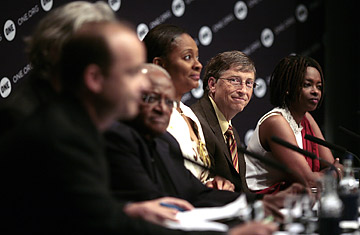
Former chairman of Microsoft and co-founder of the Bill and Melinda Gates Foundation Bill Gates, second from right, is pictured in central London, on June 11, 2009, during the launch of ONE's 2009 DATA Report, which tracks progress on the G-8 promises to Africa made in Gleneagles in 2005
It may be no surprise, in light of the global economic recession, that the world's richest nations have failed to deliver much of the aid they promised Africa four years ago. But campaigners are not letting the Group of Eight (G-8) industrialized countries off the hook. According to ONE, an advocacy group founded by U2 singer Bono, most of the blame for the shortfall in pledges made at the high-profile Gleneagles summit in 2005 rests on just two countries — Italy and France. Italy, which next month hosts a summit of G-8 leaders, has delivered a minuscule 3% of the amount it pledged at Gleneagles, according to ONE's annual DATA report tracking aid delivery. France has given just 7% of its pledged amount.
At Gleneagles, the leaders of the U.S., Japan and the wealthiest European countries vowed to supply $21.5 billion in aid to Africa by 2010, to help the continent work its way out of poverty by tackling dire problems in health and education. But with just a year to go, only $7 billion of the additional $21.5 billion has come through — with France and Italy accounting for the bulk of the shortfall, although that could rise to about $11 billion by the end of this year. The star of the donors is Britain, which is on track to become the first G-8 country to meet the target of spending 0.7% of its national income on aid. Still, the G-8 as a whole looks unlikely to achieve its targets. ()
The leaders who pledged the $21.5 billion in 2005 obviously hadn't anticipated the global downturn that would force them to spend hundreds of billions on bailing out their own floundering economies. And the squeeze on the finances of G-8 countries is likely to worsen next year, as governments scramble to lower their deficits rather than risk inflation in the midst of rising unemployment. Overseas aid could then suffer even further cuts. "As governments look to cut deficits, they will look to cut all parts of their budgets, and these parts that are to help the poorest may or may not be cut as part of that process," Bill Gates told reporters in London on Thursday after the release of the DATA report. The Bill & Melinda Gates Foundation operates in numerous African countries, and its $27.5 billion endowment makes it a far more significant donor than foreign governments are in some countries.
Cuts in aid budgets by the industrialized nations could prove disastrous for some African countries, according to the Africa Progress Panel, a group led by former U.N. Secretary-General Kofi Annan. "The financial meltdown that evolved into an economic recession has now become a development crisis," warns the panel's report, released on Wednesday. "Combined with the food crisis, the volatility in fuel costs and climate change, it threatens to reverse Africa's recent progress."
Booming prices for oil, copper, gold and other commodities over the past decade have produced annual GDP growth rates as high as 6% in some African countries. But the International Monetary Fund predicts continent-wide economic growth of only about 1.7% this year — compared with last year's growth estimate of about 5.5%. ()
Despite Africa's being a major focus of G-8, the group includes no African leaders — nor China, whose investment in African infrastructure exceeds that of all the G-8 countries combined. Singer Bob Geldof urged on Thursday that the discussion be widened, warning that unless more countries are at the table in international decision-making, "our system will fail again."
For some African economists and political leaders, the aid shortfall isn't necessarily the most critical problem. A fierce debate is playing out among aid and government officials about whether money for Africa is even worth it — ignited largely by the best-selling book Dead Aid, written by the Zambian economist Dambisa Moyo, who argues that $1 trillion in Western aid during the past 50 years has left the continent more poor and dependent. Her sentiments were echoed by Rwandan President Paul Kagame, who wrote in the Financial Times last month that "as long as poor nations are focused on receiving aid, they will not work to improve their economies." But others have pointed out that carefully directed aid can play a critical role in removing obstacles to economic development. Gates told reporters that projects that focus on agriculture and health are "measurable and very impactful. The money had made a difference."
The debate may be rendered moot by the financial woes of the wealthier countries, especially the current holder of the G-8's rotating leadership position, Italy. Geldof on Thursday tore into Prime Minister Silvio Berlusconi's government, which he called a "crowd of shysters" at a press conference. "How can you possibly trust any government that promises something, does nothing, and expect them to lead the world?" he fumed to reporters. "How dare they?"
For his part, Berlusconi said after a meeting Wednesday in Rome with Libya's leader, Muammar Gaddafi, that African poverty was "a big problem that requires a big decisive response from all those who are fortunate enough to be well-off." Berlusconi reportedly said he believed some African leaders had funneled aid funds to their personal Swiss bank accounts.
So while figures such as Geldolf and Bono continue to try to shame the wealthy of the world into giving to the poorest, some tough economic realities are likely to intervene when the eight richest leaders converge in Italy to crunch the numbers for African aid.
